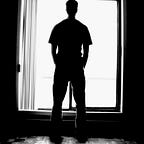The Story of My Family
I was texting with my sister a few days ago, and we got talking on the subject of how sexist our family is. My dad would compare my mom to Playboy bunnies, leave dirty magazines lying around the house. My mom, in turn, told my sister that if she ever wanted to make a man happy she had to be petite or they’d leave her. Our grandma told her to get pregnant by a wealthy man so she wouldn’t have to work. Our other grandma told me to sleep around — just make sure to never let any of the women know about each other, because you know how women are. Neither of us could recall ever being told we were loved or that our parents were proud of us.
When I was 13 years old, my mom had a mental break down. She pulled me aside, eyes tear-filled. She’d walked into a gun store, but couldn’t muster the courage to complete her purchase. She was sorry — not that she’d done it, but that she didn’t have the guts to kill herself. Sorry that we weren’t a family, sorry that we had to put up with her another day. I easily pictured her standing in the doorway, staring at firearms longingly, believing as sure as she breathed air that a few simple moves could end not only end her suffering, but the suffering of those around her.
When I was 17 years old, I stood up to my dad for the first time. I was used to cowering as he yelled at me, trying to make my body as small as possible in case he hit me again. We grappled in the kitchen, his arms on my shoulders, my arms on his, his eyes fierce, daring me to throw the first punch. Instead, I felt pity. I thought about how utterly sad our situation was. A grown man — a father — twenty years my senior, yearning for an excuse to take out his anger on his son. I walked away. Around midnight, I packed everything I had and left. I never lived with him again.
There are many other stories I could say, but these two stand out as my most “life defining.” They shaped my teenage years and stayed with me as a young adult. When I looked in the mirror, trying to determine who I was, what my value was as a human being, I turned to these events for answers. The result was a life was filled with mental health issues. I’ve been anorexic. Suicidal. Agoraphobic. Felt depression so intense I physically could not stand.
Decades of medication and therapy have taken me from a barely functioning human into a semi-productive member of society. I don’t know, though, if I’ll ever be able to heal that hole inside myself. If I can’t, should I resolve myself to being a broken person? Or simply acknowledge it and try to work around it as best I can?
It’s very easy to say “I won’t let my childhood affect me,” but childhoods affect everyone. That’s inescapable. For better or worse, these were the formative years of my life — my training — and they left a mark on me. How do you know what the right thing is when everything you know is wrong? Worse, how do you define yourself when you don’t even know who you are, just that you’ve hated living? There are no easy answers, especially when self-discovery is marred by an utter lack of self-confidence, and your concept of a “balanced life” is “50% pain.”
At one point, I thought that if I really and truly loved myself things would magically work out. Turns out, love is just the first step on a long, bloody road full of bad habits and self-destructive tendencies. You can love yourself one day, hate yourself another. When your soul is in gridlock, you don’t stop bad things from happening, and they ruin your life in exactly the ways you knew they would.
I’m still struggling with the question, “How much do these experiences define me?”
Or put another way: “How do you build a skyscraper from mud?”
